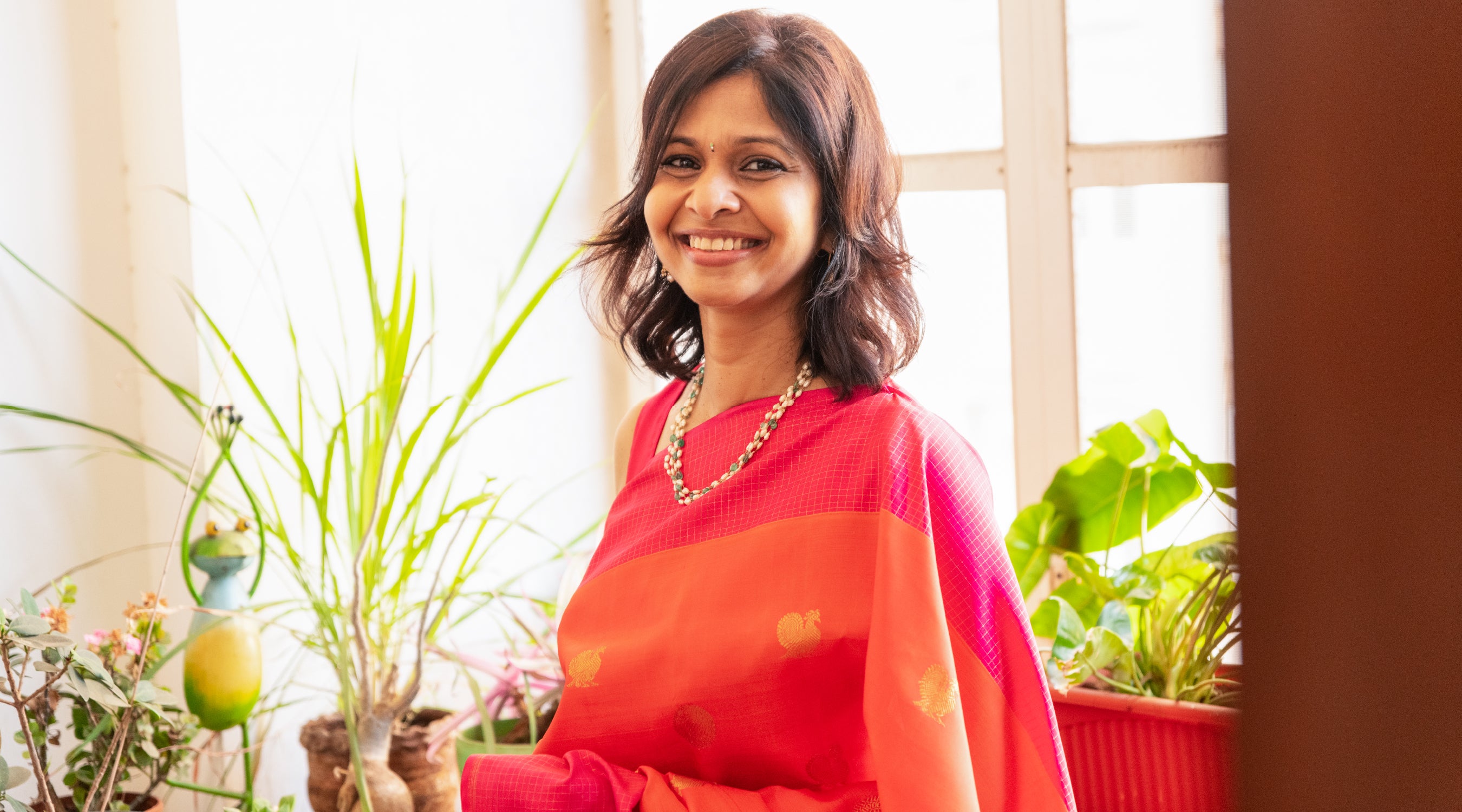KANAKAVALLI VIGNETTES : Archana Kalpathi - Reel Life

Kanakavalli’s June Vignette, Archana Kalpathi, discovered a love for film in childhood, but never imagined she would one day make a career in cinema. Now the CEO of AGS Cinemas and Creative Producer of AGS Entertainment, Archana continues to delight in movies—in the way they transport her to other worlds, offer her an escape from reality, and draw her into stories she can find herself in. In this breezy conversation with Aneesha Bangera of The Kanakavalli Journal, Archana reminisces about her journey, from the mistakes she made and lessons she learnt, to the moments she will never forget. For Archana, work doesn’t feel like work anymore because she has found her passion, a rare and valuable thing. Listing some of her favourites in the world of cinema, Archana also gives us her recommendations for the best things to watch online this season of lockdowns. As you continue to stay home and stay safe, we hope that this conversation and Archana’s picks for films and web series offer you a moment of distraction; a brief escape from the uncertainty to inspire hope and positivity.
In the midst of rescheduling projects, managing deadlines and, of course, catching up on the latest films, Archana takes the time to curate a selection of fine saris from the Kanakavalli repertoire. Excerpts from the conversation below…
Reel Life
When did you first discover a love for films?
My family was a very academically inclined one, and we were all encouraged to study hard, and yet, cinema always played a very important role in bringing us together. We would watch movies on weekends, on holidays and special occasions. We watched films of all languages, from English, Tamil and Hindi to Telugu and Malayalam. As a family, I think we were always very open to stories from different parts of the world. The movie watching experience has always been a part of what ties us together.
In this way, I discovered a love for cinema when I was very young. I loved how a film could transport you into a different world, allowing you to forget—if only for a moment—the real world. Movies have always been an escape for me, a way to leave behind all my worries and relax. Despite this early connection forged with cinema, I never, ever imagined I would one day make a career in the field.
As the CEO of AGS now, what is it like to be on the other side of the screen? What have been the highlights of your career so far?
Becoming the CEO of AGS Cinemas and then making the foray into distribution and production was a happy accident. I have an engineering background, with a BE and MSc in Computer Science. When I graduated, my family had just sold its software business, and had cash to invest. Around this time, the concept of multiplexes had started to take off in the US, and was growing popular in Chennai. When an old theatre came up for sale, we decided to buy it and build out a multiplex—what would become the first AGS Cinemas. We went on to open more properties, and gradually, as I watched films every day to understand how they would fare and how they should be scheduled, I began to collaborate more closely with the distribution and production teams. Eventually, I started to work in both departments, bringing to them the business perspectives that I had gained while running the theatres.

Above: Views of the beautiful AGS Cinemas, where Archana, as the CEO, focuses on welcoming audiences to a memorable and enjoyable movie watching experience
I absolutely love my job. I think I’ve found my passion, and I realise how fortunate I am, because that is often a very difficult thing to do. As a result, work doesn’t really feel like work anymore—I think I’m sort of addicted to it! I’ve always loved to entertain and host people, and I think my work draws on this part of my life. I truly enjoy welcoming people into our cinemas, making sure that everything is organised, clean and beautiful so they have a seamless and memorable experience.


As a lover of films herself, Archana thrives on her work as the Creative Producer of AGS Entertainment.
While production might seem like a very creative field of work, there is in fact a lot of organisation that goes into it. As producers, we are not technically creative ourselves, but we work closely with incredible creators, which has been extraordinarily rewarding. To see the final film in your own theatre is an extremely fulfilling experience—there is nothing like watching an audience react to scenes you had only imagined when you first looked at a script.
One of the biggest highs I ever experienced was when we opened our first theatre on June 18, 2010. It had taken us three or four years of work—getting licences and approvals, understanding the rules and regulations. I made a lot of mistakes but learnt invaluable lessons.

Above: Archana with her father and uncles at the Bhoomi Pooja for the Maduravoyal property of AGS Cinemas.
I was also fortunate to build a wonderful core team of people, most of whom still work with me today. Getting the opportunity to distribute Rajinikanth’s Kabali was another unforgettable experience, and more recently, I was thrilled to be the creative producer of Bigil.

Above (left to right): Archana with the team after signing the project for the film 'Kavan'; At the audio launch of 'Bigil', one of the highlights of Archana's career
Due to the pandemic, we have had to pause production on some of our projects, while our theatres have been closed. We have some exciting films coming up, but we have also had the chance to explore and play around with the web series format which has been very interesting.
In a largely male-dominated field, what has your experience as a woman been? What do you hope to see in the future of Tamil cinema?
When I first started out, I always wondered why people asked me this question, because I believed that I was never treated differently from my male colleagues. It is only as I grew older that I began to recognise the privilege and protection that my family offered me. The support of my family, and especially my husband who equally shares the load of home and childcare with me, allowed me to get things done without feeling I was ever at a disadvantage as a woman.
Some of my most incredible colleagues at work are women. I know I can rely on them 24/7 because of how hard they work and how effortlessly they multitask. But I have realised that, especially in an industry like ours, women face many challenges. Without the support that they need, they often have to give up their careers after getting married and having children. Not only is it important to have a support system, like I have with my family, it is also important for organisations to find ways to allow women the flexibility they might need to get their jobs done. As women, we are often made to feel guilty for choosing career over family, but it’s important to be forgiving of yourself. I have been so fortunate in this regard, and I hope that more women are able to find the help they need to pursue their passions and careers.
I would love to see more women writing for women in Tamil cinema. Right now, a lot of roles for women are being written by men, and while they might do a great job of this, I feel that there is often some nuance missing. I’m looking forward to collaborating with some of the amazing women directors and writers in the field.
What do you look for in a script?
I think the single most important thing for me personally when I look at a script, is whether I can relate to it. Someone in the movie needs to be me—whether it is the protagonist or a supporting character. I like to be able to empathise with the characters and the story. On the other hand, I also love fantasy; stories that give us something to dream about or aspire to.
It is often very difficult to gauge whether or not a script will work. You can love it on paper, but when you see it on screen you might feel differently. A lot depends on the director and the way in which the story is brought to life.
Which directors’ films do you make sure never to miss?
I’ll never miss a Mani Ratnam film, and make sure to be there for the first day, first show. I think he brings a great deal of finesse to his storytelling. He’s always stood out from the rest and addressed unusual subjects. I can’t wait to watch his Ponniyin Selvan.
I also try not to miss a Shankar film… Actually, now that I think about it, it’s very difficult to name just a few directors! I make an effort to watch as many films as I can by every director.
Tell us about the scenes that you will never forget from movies you have loved.
I think I was blown away by every scene of every Star Wars film I ever watched. There is an absolutely stunning action sequence in The Lord of the Rings, in which an elf is fighting on an elephant. This was at a time when computer graphics imagery, 3-D and other visual effects were gaining ground, and this took the production value of the film to another level.
The opening sequence of Gentleman, in which an actor is running on top of a moving train is another that will always stay with me. And I also loved the opening scene of Roja, which transports the viewer to Kashmir.
Who do you think of as the icons of Indian cinema?
I think while every actor, director, producer and artist is an icon in her or his own right, it is AR Rahman who truly put Indian cinema on the world stage. His music is the music of an entire generation, and he truly stands tall in the world of Indian cinema.
Who are the actors—both in India and around the world—whose work you admire?
I’m a huge fan of Vijay, and producing Bigil was one of the most exciting things I’ve ever done. I had an image of this actor in my head, but working with him far exceeded my imagination. In South Indian cinema, I also really admire Trisha. In Bollywood, my current favourites are Alia Bhatt and Ranveer Singh. When it comes to Hollywood, Jennifer Lawrence and Russel Crowe are actors I enjoy watching.
What are your top recommendations for the most underrated gems currently available on streaming platforms?
These might not be underrated, but here are my top picks—

Archana's movie picks (from top left, clockwise) : Mandela, Cinema Bandi, Pagglait, Joji, Nizhal

...and her show picks : Mare of Easttown, It's A Sin, The Queen's Gambit
What film are you most looking forward to watching this summer? What are you currently binge-watching?
I can’t wait to watch Gangubai Kathiawadi starring Alia Bhatt, and M Night Shyamalan’s Old. Right now, I’m only watching movies—I’ve managed to watch a movie a day during this lockdown!
If you could produce the remake of one film, which one would it be?
If I had the chance, I’d love to make something like Star Wars or The Lord of the Rings. It would have to be fantasy; something super creative and massive in scale. I think it would really challenge us, but would also be really exciting and fulfilling.
What is the one outfit or costume from a film that you consider truly legendary?
My absolute favourite outfit from a film is Audrey Hepburn’s iconic black dress in the opening scene of Breakfast at Tiffany’s. I think our Indian version of the classic black dress is the sari—I love how it has been worn by different artists in different films across generations. Everyone has their own interpretation of the sari and that’s why they make amazing costumes.
Bringing it back to Kanakavalli, what does the sari - and the kanjivaram in particular - mean to you?
As a child, I remember always wanting to wear a sari. I would look at my mother’s and grandmother’s saris, and look forward to the day I could wear them myself. In school, I wore them for special occasions, and then I, like many others, went through a phase when I thought saris weren’t cool. Fortunately, it was a short-lived phase and I fell in love with it all over again as an adult. After having a child, with the shapeshifting that involves, you realise the sari, and especially the kanjivaram, is truly a forgiving garment. No matter your age, height, shape or size, the sari makes you look truly beautiful. I look forward to Navaratri and weddings because it’s an opportunity to pull out my favourite kanjivarams.

Above (left to right): With her mother, sister and aunts, all dressed up for Golu; Archana with her sister.
How do you define beauty and tradition?
Beauty is simplicity. Fresh flowers, balconies dotted with green plants, pictures drawn by children, a home-cooked meal, and a simple conversation with a close friend are all things I find beautiful. I also find beauty in a scene that is just very well-written, with no need for any gimmicks.
I love tradition. Not just the religious ones like Diwali or Golu, but also small things that we do as a family on special occasions. I come from a big joint family, and I get very nostalgic about my grandparents. There are some traditions I insist on carrying on so that they stay in the family, and while this sometimes drives my husband and son crazy, I still think it’s worth it.
Tell us about the sari you have chosen for the Vignettes shoot?
As a child, my grandmother had bought me a paavadai in a gorgeous shade of copper sulphate blue that I absolutely loved. I have been looking for a sari in a similar hue for as long as I can remember. Two diwalis ago, just when I’d almost given up finding the right colour, I stumbled upon this kanjivaram at Kanakavalli. I wore it for a family occasion, and it is one of my favourites.

(Archana is wearing a stunning Kanakavalli kanjivaram in blue with gold zari checks on the body. The hot pink korvai borders shot with vermillion are adorned with peacock, lion, horse, deer, elephant, paisley and geometric patterns all woven in rich gold zari.)
- Archana Kalpathi, in conversation with Aneesha Bangera, photography by Raghuram Vedant.
View Archana's accompanying guest curation here.



